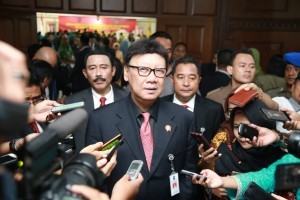Govt Encourages General Elections Commission to Promote Smart Campains

Home Affairs Minister Tjahjo Kumolo answers reporters’ questions, in Jakarta, Saturday (8/9). (Photo by: Ministry of Home Affairs).
The Government through Minister of Home Affairs Tjahjo Kumolo hopes that dialogical campaigns are to be promoted more ahead of the 2019 simultaneous general elections. Tjahjo further said that dialogical campaigns are a form of smart campaign where political parties and campaign team bring potential leaders closer to the public.
In addition to educating voters to think in a smart and rational manner, Tjahjo added that dialogical campaigns also become efficient and effective means to spread ideas and thoughts.
To this end, Tjahjo encouraged the General Election Commission (KPU) as the election organizer to promote dialogical campaigns. “I hope that in the 2019 simultaneous elections, KPU will put forward smart campaigns,” Tjahjo said in Jakarta, Saturday (8/9).
According to Tjahjo, all candidates and campaign team both running in the legislative or presidential elections will be challenged to offer ideas, concepts, and thoughts.
Through a dialogical campaign, Tjahjo said that communication with the people would be created in two directions, adding that candidates can absorb the aspirations of the public and the public are given the opportunity to deliver their ideas. The dialogical campaign will also encourage political maturation of the public.
“At least candidates will know more about the needs and aspirations of the public. On the other hand, the people or constituents will get to know more about the candidates,” he said.
Running campaigns involving mass mobilization, according to Tjahjo, is more harmful and vulnerable to trigger chaos, adding that program presentation can only be conducted well in a limited meeting scale in the form of dialogue.”It is only possible to be realized in a dialogical campaign,” he said.
Second, Tjahjo continued, in a dialogical campaign, there is room for voters to think critically and rationally and examine and test the programs or ideas offered by their candidates or campaign teams.
Third, dialogical campaign provides political education that enlightens, educates the public, and the programs of political parties and candidates can be offered more transparently and accountably.
Fourth, with a dialogical campaign, people do not just gather to have fun, but are more participatory and place the public as subjects in the political and development process.
The dialogical campaign, according to Tjahjo, can also prevent horizontal conflicts and keep the public away from negative campaigns that are pitted and misleading. “Not only that, dialogical campaigns are more efficient in terms of costs, time, and energy, and there are many other benefits,” he said.
Tjahjo also later explained the rules of the campaign which are regulated in the Elections Law and in the KPU Regulations.
Under Article 1 Number 35 of Law Number 7 of 2017 on General Elections, election campaign means the activity of election participants or other parties appointed by candidates to convince voters by offering the vision, mission or self-image of candidates.
“Meanwhile the campaign period is regulated in the KPU Regulations Number 5 of 2018 on Stages, Programs, and Schedules for Organizing the 2019 Elections,” he said.
As previously reported, the KPU has stipulated that the campaign period will run from 23 September 2018to 13 April 2019.”The cooling-off period will start from 14 April 2019. The simultaneous elections will be held on 17 April 2019,” he concluded. (Ministry of Home Affairs/ EN)(MUR/LW/Naster).








